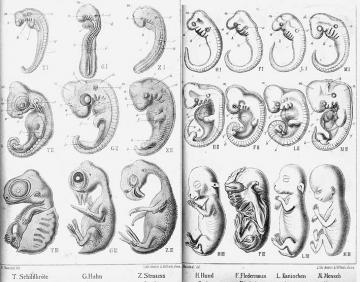Evolutionary developmental biology is a vital and active field of study. High school biology textbooks rarely cover it in detail, so Explore Evolution might have done a service by offering a brief exploration of that modern field. Instead, it focuses on creationist hobbyhorses from the history of biology. Most prominent of these historical arguments is a debate over illustrations by Ernst Haeckel.
 Later illustrations from Haeckel: Haeckel continued to update his illustrations as better ones became available.
Later illustrations from Haeckel: Haeckel continued to update his illustrations as better ones became available.These century-old drawings, like any historical illustrations, have errors. Historians reviewing Haeckel's life and work are confident that he used the best illustrations available to him, and that he did not intend to mislead his readers. Contrary to claims in Explore Evolution, a comparison between that illustration and more recent photographs does not show a stark difference. Haeckel's drawings omit the yolk, while illustrations by Michael Richardson do not do so consistently. When the yolk is digitally removed from the images, the similarites become clear again. Nonetheless, Explore Evolution claims these illustrations are "possibly fraudulent," and implies that all of modern evolutionary developmental biology depends on those illustrations' fate. In fact, Haeckel's illustrations, like his idea of recapitulation (which the book wrongly claims Darwin accepted), have been superceded by more recent research.
This is also true of the book's discussion of Adam Sedgwick's writings against von Baer's law. That single essay from 1894 does not invalidate all the subsequent research of the last century. Recent research has specifically addressed many of the claims quoted from Sedgwick's essay, and it is foolish and inaccurate for students to be presented with Sedgwick's essay as if it were the last word on the matter. Inquiry-based eduation requires providing students with enough information that they can conduct their own inquiry, yet this chapter does not give even a basic understanding of modern embryology, and its account of the history of embryology is profoundly inaccurate.
